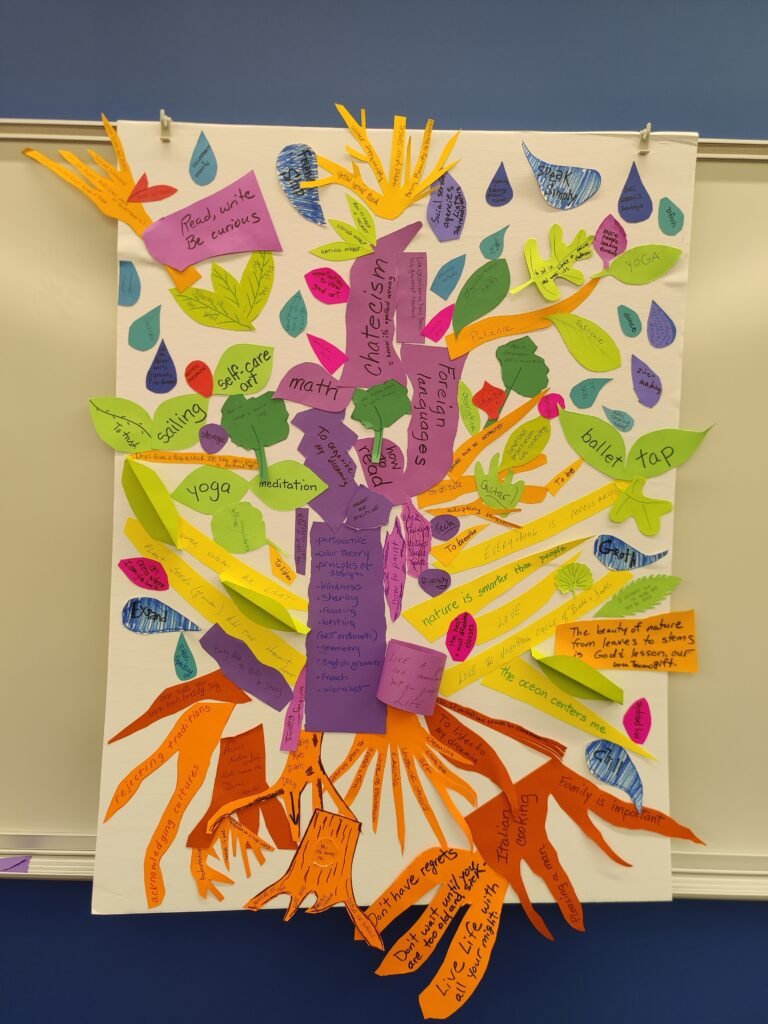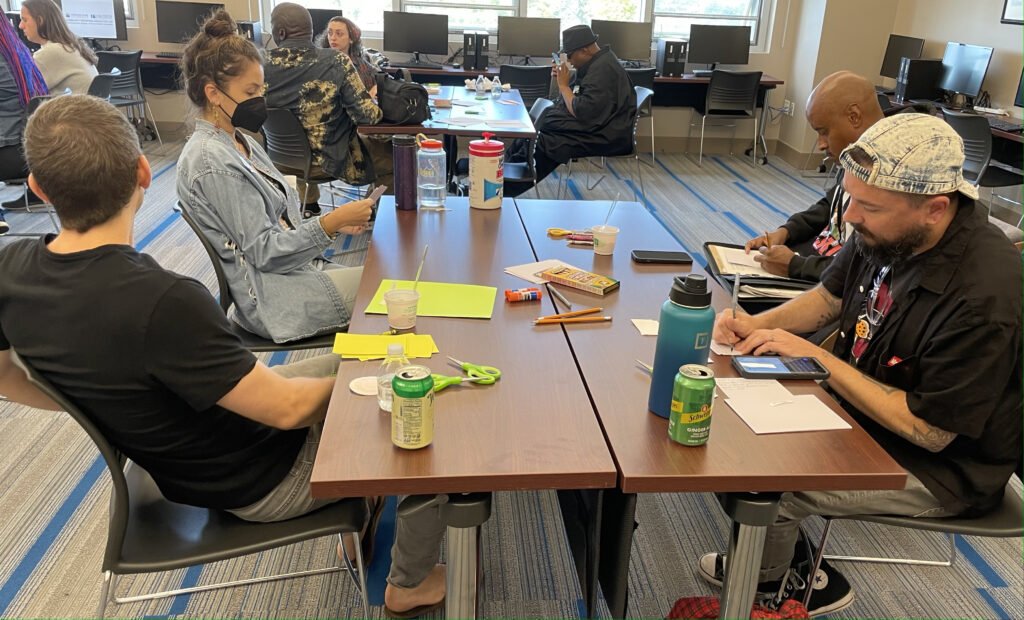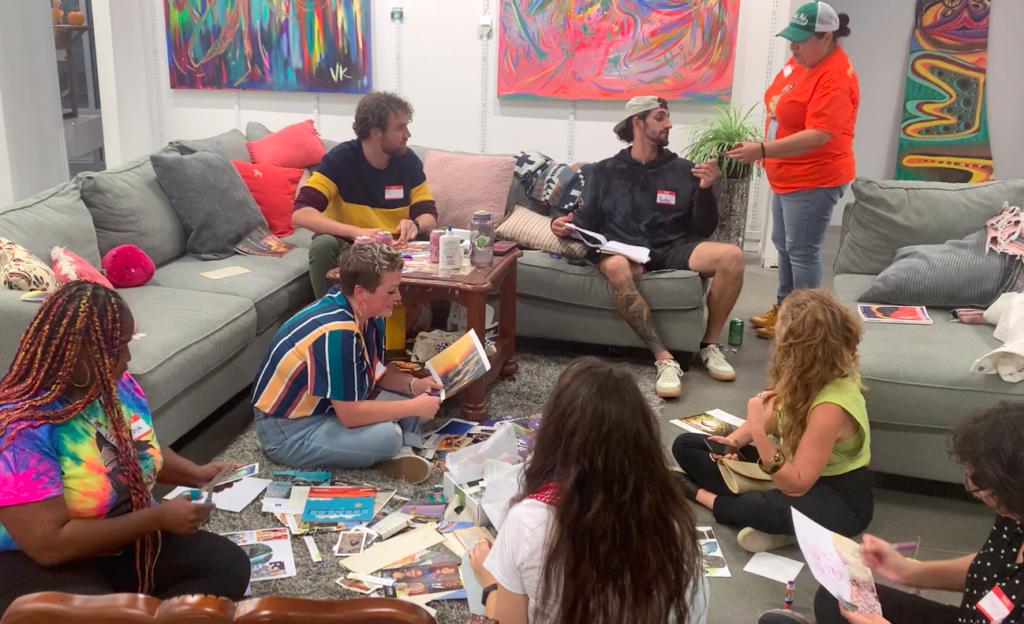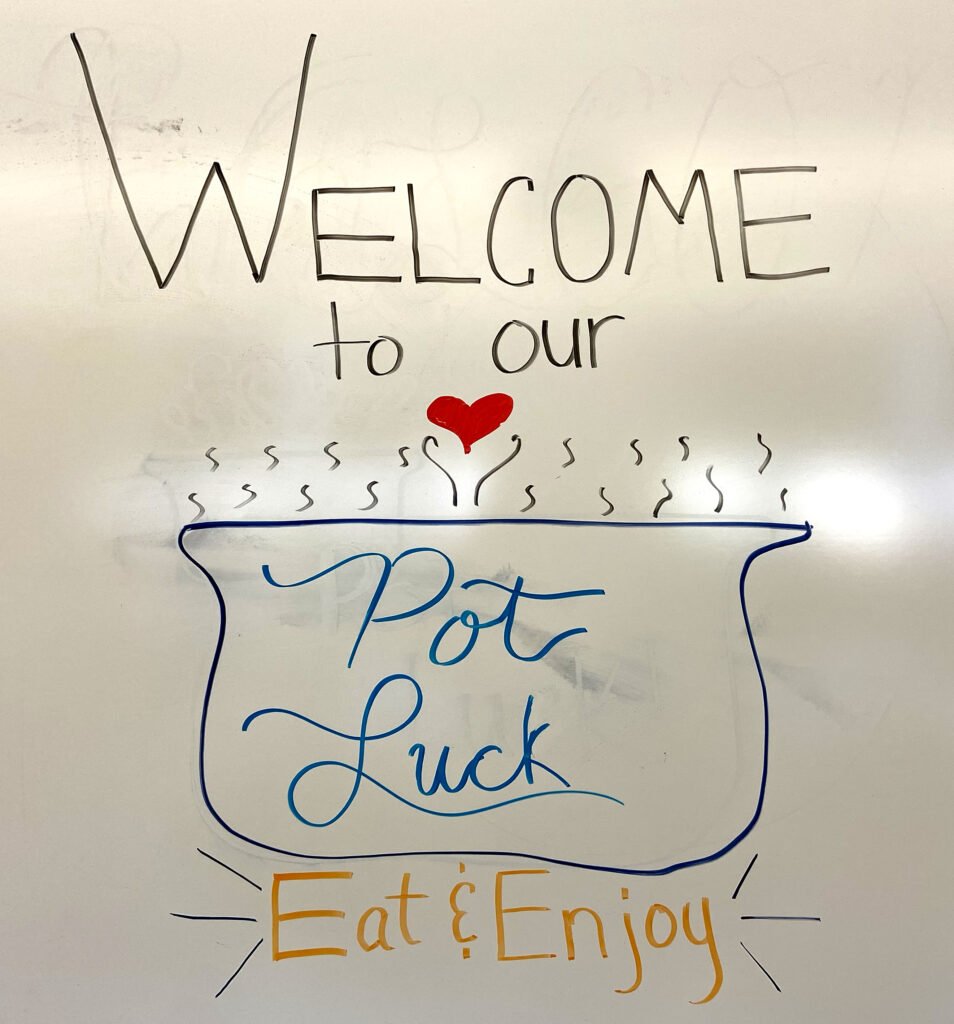Artist Meetup Blog Entry 1
July 2023–January 2024 Recap
To break the uniformity of a blank page is a daunting thing.
And then, to let a single sentence sit with flashing cursor: idle, idle, idle.
Prelude
I begin this first letter to you from an unexpectedly snowy middle of January. Typing this, my hands are dry and my fingers cold, but my heart is full and my mind is wandering the possibilities of this new format of communication. The brunt of the snow fell a few days ago, and now the sky is a polished crystal pane, cerulean, and the blanket has settled into a glistening crust of diamond. The long shadows, lapis, fall silently across the white fields, and a car honks in the distance.
This blog is an experiment. I think of all the things it could be, of all the things it should be. And then I pause and sit with the thought that no one expects anything from this other than me. Just as with the artist meetups’ format, this medium will reveal itself through constant play, revision, and community feedback. I write to you here because I want to write to you here, and I know, joyously, that you will receive me and my ramblings. What a gift that is. Reciprocity. I am so enamored by our beautiful little community—all the shapes it’s taken, all the love that’s been poured into it—that I feel supported to share my thoughts.
The idea for this blog comes out of revision, but first out of failure. I think that most great ideas come out of failure—it’s important and freeing for me to remember that failure should always be on the table, as a step in process. This particular failure was one of trying to combine too many voices: during the holidays, I was drafting up our new artist meetup landing page and a write-up explaining the artist meetups’ origin and I couldn’t quite find the voice to use for the latter.
Should the piece explain the meetups in a technical way? From the vantage point of an artist? As a member of the community?
My colleague and friend of our artist meetups Byonce suggested I was trying to fit too much into one space, that I was (to paraphrase) in a mindset of scarcity rather than one of abundance, and that I should consider how to allow space to showcase my multiple voices, my multiple selves, in the ways that I do during our artist meetups (as facilitator, organizer, note-taker, community member, fellow artist, gremlin, etc.), rather than muting them by stuffing all the disparate flavors into one pot of soup.
This blog is our opportunity to reflect on the time we’ve shared in our meetups. After this big one, it will generally be a one-season reflection. For all, I’m imagining that I’ll write a bit about what I had on my mind before the new season began, how it evolved over time with community input, and how I think it went. Throughout, I invite you to share your thoughts with me so that we can include your voice into these entries, too!
And, if I can fit it in, I’m going to share a bit of the background thinking that happens when planning and running these meetups in a pedagogical sense, which is to say, what theories and scholars and ancestors I’m drawing on for inspiration in our meetings. Nothing in our world occurs in a vacuum. Our artist meetups—those of you who have attended in any way over the last 7 months may be able to attest to this—exemplify that it is better to inspire and learn from each other than to try to compete for some arbitrarily-created spotlight.
So let’s do this thing! Our very first recap! I’m excited.
Season 1
July 2023
The inaugural meeting took place in July. At the onset, the idea of the forum meeting was all I had set in stone, believing that the thoughts and dreams and hopes and fears we received on that day would help guide the next stages of the meetup curriculum. The SOAC team had seen the need to get folks together to chat and decided that it should be our place to listen and note-take. So that’s what we did!
We brought food and friendship and we received with open ears and note-taking hands. A common desire during this first meeting was to figure out what the purpose of these meetups should be, whether that be a space to teach each other things, showcase our works, exchange resources or time. Present on the lips of many, and on the furrowed brows of others, was the request to learn how to do some of the nitty-gritty of art-making, like data collection necessary for grant writing, grant writing strategies themselves, how to locate grants, partnerships, sponsorships, how to manage social media and advertising, etc. Even in this very first meeting, I could see our community members offering suggestions, services, and aid to one another; I realized how easy it could be for these meetings to become something much more niche or hyper-focused, losing the community-building possible in generality*. This inspired the curriculum that we’ve adopted (forum/deep learning/trading post), prioritizing three rotating modes for our membership to engage with collaborating: speaking/listening, learning ourselves/each other/our landscape, and applying that knowledge to offering each other aid/ease of burden.
*Briefly jumping ahead, I’ll mention that still present on my mind this many months later are those requests for tangible services. At the moment, Stories of Atlantic City and our artist meetups just aren’t the place for them, in no small part because SOAC just doesn’t have the resources to lay the groundwork for those tangible services, but there is a strong need, and we would happily support anyone interested in organizing those niches trainings. If that’s you, get in touch!
August 2023
In August, we rolled out our first Deep Learning meeting with an exercise called the “Tree of Knowledge.” It is an adaptation of an activity from a report by Larry Olds, “An African Tree of Knowledge,” in Teachers for East Africa and Teacher Education in East Africa: TEA/TEEA Newsletter, No. 5, July 2001.

Purple: Bark: Knowledge from formal schooling that is valuable in your life today.
Gold: Branches: Lessons learned from nature that you hold dear.
Green: Leaves: Things you learned from self-directed or non-formal learning.
Pink: Buds: Identify a need, such as knowledge you hope to learn from a peer present at these meetings, or assistance resolving a difficulty.
Blue: Raindrops: Identify knowledge, a skill, or a service that you can share with your peers.
I was really excited to play with this exercise, as it felt flexible and offered space for participants to engage with it in a variety of ways. My biggest takeaways from the day is that navigating leading, teaching, and participating all at once is tough when it feels like you have to check individual boxes for each of those titles.
In these early days of the meetups, I was really committed to not making any decision completely alone, rather trying to provide fill-in-the-blanks for members to help curate into something collectively-created. What I found was that, very reasonably, sometimes members just wanted to be told how to do a thing! Sometimes a vague “I don’t know, what do you think?” doesn’t come off as inclusive and inviting but irritating and ungrounding. This exercise taught me that.
Synthesizing leading, teaching, and participating could look like this:
At the beginning of the exercise, we had this blank two foot by three foot foam core board hanging from the wall. Members were writing their first answers, their “roots,” onto construction paper and then were asked to glue the roots in place. One member came up to me, perhaps the first one finished with the “roots” task, and said that they were ready to glue their “root” in place, but that they didn’t want to do it themself, that they didn’t feel like an “artist” in the visual sense (they are a different kind of creative practitioner), and that they had an issue with being the first to break the plane. They asked if I would physically do it for them. Of course, I agreed, and asked if they would point to where they wanted it to go. They pointed. I glued and placed, and so began the making of the tree!
This was a special moment for me. It reminded me that we are all in those spaces to offer each other something. The act of entering that room is sheer bravery. To ask for help is courage. To hold someone’s words or story or “root” is sacred. That meeting has been a guiding light for me in the months since, a reminder that my presence is welcome as a part of, not apart from, the community I’m facilitating.

September 2023
September was our very first Trading Post, and, I’ll be honest, I had no idea how this one might go! I knew what I thought could be achieved in a meeting like this, but I wasn’t certain I could provide the structure or guidance to catalyze the space into something so vulnerable.
Here’s how I dreamed it up:
As artists, makers, movers and shakers, gig-economy practitioners, etc., we are accustomed to fighting for our livelihoods, our contracts, our wages, our benefits, our visibility. What would it look like if we willfully entered our community space together and temporarily kicked the idea of currency out of the room, valuing one another, rather, in equitable, non-transactional ways?

Here’s a made-up example:
• Sally is a union stagehand with a passion for baking bread. Her hours are long and she’s constantly on her feet. On her days off, the last thing she wants to think about is vacuuming or doing laundry. She decompresses by making a few loaves of sourdough every Monday morning. It’s a peaceful and meditative ritual.
• Lex is an art teacher and a practicing watercolorist. Their work/art-making balance is fairly consistent, shuffling back and forth between their day-job and studio, but they often miss the opportunity to make food for themself, resorting instead to takeout and frozen meals.
= Sally offers Lex a bread delivered to their doorstep every Monday afternoon, a great way to start the week, and Lex offers to visit Sally’s on one of their days off each week to help tidy up and provide company to make the chore less monotonous. To each, the other’s offering is priceless.

In an exchange like this, our community members could begin to practice non-monetary value assessment of one another; who could say, in a specific moment such as this, how much “value” a weekly homemade sourdough or the company and assistance of a friend has?
Ultimately, my goal was for us to begin to investigate community learning methods for practicing altruistic trading and receiving.
The meetup went fairly well for our first round of trading. Many seemed to be excited to investigate what they might be able to offer to their colleagues, and what their colleagues might be able to offer to them. There was a lot of mingling and chatting and silliness. In line with the previous month, I felt that I had still not figured out a good system for introducing an exercise with specific guidelines or structures, and I could see how that slowed down the process of interactions. Excitingly, some members decided to do away with the concept of the “trade” all together and started offering one another specific services or assistance for no exchange. This was the goal and it got there naturally!

Interlude 1
October 2023
In October, we had to juggle scheduling issues and instead of missing a month we decided to hold an impromptu Artist Meetup at the C.R.O.P.S. store. Huge thanks to Claire, Lisa, and Alexis at C.R.O.P.S. for supporting us in a pinch! Being that this was in between our newly-formed curriculum, I wanted to use this meetup to simply provide a space to gather. We brought materials for collaging, folks brought snacks, and we just sat together, chatted, and had an unexpected poetry reading!

(Paintings in the background by Victoria Katherine and Gary Lindley)
You may notice a theme at this point! Over the four meetings so far, I was beginning to learn that this sort of community organizing requires an ever-present conversation between two elements: a strong foundation and a willingness to improvise. The former provides communal confidence for the latter. I like to think that, as community organizers, we are asked to bring the safety with us. What that looks like, comprehensively, is the strength to be firm with certain guiding principles (such as instructions) and fluid with everything else.
This impromptu meetup was a favorite. It gave the space and the flexibility to see our members let loose and just be themselves among newfound friends. What a gift.
Season 2
November 2023
November, a Forum meeting, the beginning of our second season! It was at this point that I realized I should be compiling the meetups’ notes on a google doc for all to see, as a way for participating members each month to take the conversation outside of just our physical monthly gathering space. In fact, you’ll see that this guided how I constructed the rest of the season’s curriculum as well, intent on spending the entire season taking copious notes for the group.
As I approached this season, I was thinking a lot about a class I was taking, a “Practicum for Teaching Writing,” for the grad program I’m currently finishing. For this class, we addressed a lot of hands-on needs as well as conceptual and pedagogical issues. Something that really interests me, and what we see at play in our meetups always, is building space for what is called an “embodied practice.”
Simply, the issue it seeks to resolve could be explained like this:
Often, we see spaces of learning as hierarchical—we see academia as apart from the world—and we are asked to engage with those sorts of closed-off spaces by closing ourselves off, by becoming floating heads, disconnecting ourselves from our bodies and just representing our knowledge and our logic in formalized and restrictive manners. Well, what does it take to start to break those structures apart? How can we reconnect ourselves to our bodies in meeting spaces? In our art practices? In our relationships?
There’s a lot of writing on this, and I highly suggest starting with “Teaching to Transgress” by bell hooks. It’s a masterpiece, and very accessible. And while it may seem like it’d be a dry or hyperspecific read, it’s really mostly about how we create spaces of safety together, wherever and however we are. Anyway, I highly recommend it.
Swirling in my brain just prior to this second season of meetups was an article I read called ‘Me/We’: Building an Embodied Classroom by Kendra N. Bryant. In it, Bryant explains some strategies she devised for crafting hyperlocal community, and one such tool happened to be expanding out the classroom into the digital space. As simple as it might sound, allowing us to engage with one another in spaces of collective writing and editing helps to shape our relationships to ourselves, each other, and our creating in deeply pervasive ways—we’ll see if this comes more into play in the future!
Now, back to the meetup.
This conversation saw our members ask me, and then also each other, a really important question: “after seeing one full cycle of these things, what is the purpose of these artist meetups?”
Many were curious as to whether they serve our community adequately at the moment, or if, in their current state, they are too restrictive or exclusive.
“You have to give them a reason to come,” one member said. The critique—one I welcomed wholeheartedly!—was that our messaging around the meetups’ purpose was not as clear as it could be. How, instead, could we increase accessibility by minimizing a sense of risk when entering a space like ours? And that is a very good question.
Finally, the group decided they would like the chance to share their art with each other more frequently, both finished and in-progress stuff. So, that’s what we scheduled for the next meetup.
December 2023
December, a Deep Learning meeting. The community asked for an art showcase and so we created an art showcase! I was enamored by such clarity in the November meetup’s ask, and when I put a call out via e-mail before this meetup, the response was overwhelming!
Here, nearly every member present shared something, from polished and recorded songs to unfinished songs performed live, stories about their craft to photo galleries showcasing their work. We discussed imposter’s syndrome and beginner’s mind. We discussed improvisation and impermanence, and how we each feel about it. Some members said that they invite improvisation, but many said that they find difficulty with impermanence. I asked if the difficulty was one they would be willing to explore further, and many (perhaps begrudgingly) said yes. And so, it has been in my notes that this coming season will center impermanence in one way or another!
At the end of this meetup, some members mentioned that, in addition to our normal Trading Post concept, they would like to have some sort of potluck. So, this is what we planned for the following month.
January 2024

Finally, January. Our Trading Post. For this, I invited members to bring a food and its recipe, so that we could share in feeding each other and providing communal and cultural knowledge. In the margins of my notebook, I had plans for this meetup to also return to the original intent of the Trading Posts, but what took place instead was much more organic and beautiful.
When members started sharing stories about food and food-making, something that returned over and over was this idea of survival: how those who came before us had to survive and how now they must survive in a different way; how we must survive by learning a completely different world than our predecessors, which is to say without an abundance of knowledge handed down from prior generations.
If you will permit a tangent, a stanza from one of my very favorite poems from one of my very favorite humans, “Catalog of Unabashed Gratitude” by Ross Gay (or listen here):
and thank you to the man all night long hosing a mist on his early-bloomed peach tree so that the hard frost not waste the crop, the ice in his beard and the ghosts lifting from him when the warming sun told him sleep now; thank you the ancestor who loved you before she knew you by smuggling seeds into her braid for the long journey, who loved you before he knew you by putting a walnut tree in the ground, who loved you before she knew you by not slaughtering the land; thank you who did not bulldoze the ancient grove of dates and olives, who sailed his keys into the ocean and walked softly home; who did not fire, who did not plunge the head into the toilet, who said stop, don’t do that; who lifted some broken someone up; who volunteered the way a plant birthed of the reseeding plant is called a volunteer, like the plum tree that marched beside the raised bed in my garden, like the arugula that marched itself between the blueberries, nary a bayonet, nary an army, nary a nation, which usage of the word volunteer familiar to gardeners the wide world made my pal shout “Oh!” and dance and plunge his knuckles into the lush soil before gobbling two strawberries and digging a song from his guitar made of wood from a tree someone planted, thank you;
This conversation around survival sparked a question, for myself and for all present. I asked us to free-write on the question “what in your life feels like survival right now?” followed by the question “what have you already survived?”
These questions jettisoned us into a powerful and vulnerable discussion on the things we need, sharing resources, and recognizing how to ask for help.
I think it serves us best for me to simply end this section with a few quotes from this meeting:
“There is no blueprint for healing.”
“When grieving loss, it is okay to consider the fullness of that loss.”
“It is a privilege to get older.”
Coda
As I wrap up this first blog post, I’m thinking about how this can also be a record of where I see us going—and wherever that is, I look forward to being absolutely completely totally wrong!
It is my desire to spend the next season using impermanence as a tool in a variety of ways to remind us how to be present together. When we consider impermanence as that which will go away, we’ve already mourned its loss before it goes. And that’s not fair to ourselves or each other. How this concept meanders into our meetups, I’m not sure, but look for it. And thank you for taking this very lengthy journey with me in recapping some of the best days of my life.
Our Artist Meetup series is supported by New Jersey Civic Information Consortium, a nonprofit that funds initiatives to benefit the State’s civic life and meet the evolving information needs of New Jersey’s communities. A first-in-the-nation project, the Consortium reimagines how public funding can be used to address the growing problem of news deserts, misinformation, and support more informed communities.